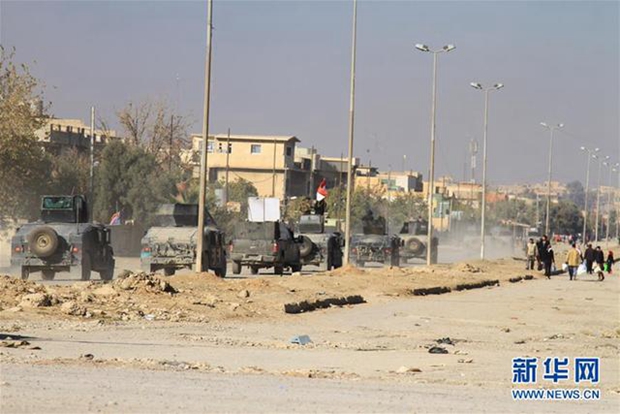Sophoclean irony in Iraq, for the United States
- By Sumantra Maitra
 0 Comment(s)
0 Comment(s) Print
Print E-mail China.org.cn, May 19, 2018
E-mail China.org.cn, May 19, 2018

In 2003, around the time when I was 20-year-old, I read something, a long one-page advertisement that came out saying how Iraq war was not in America's interest. That piece of advertisement got me interested in pursuing international relations, but that's another story.
There was one aspect however in the ad, which stated a prediction, that Iraq was a beacon of stability, which if destroyed would promote complete chaos, as the entire region from Tehran to Tartus is a huge region, with a demographic which is suitable for Iran to take control of. Persia was an empire, and commensurate with its size and population and weight, Iran has a legitimate stake in the events of Middle East. The war happened, and we know the rest.
In what could be termed as Sophoclean irony, Shia cleric Moqtada Al Sadar is set to win the Iraqi elections. Sadar is a long-term adversary of the U.S. and has the backing of Iran. Sadar is now leading the Iraqi parliamentary election with more than half of the votes counted.
So who is Sadar? The 44-year-old son of Grand Ayatollah Mohhamad Sadar who was murdered by Saddam Hussein's government, led a coalition who first arrived on the scene as a firebrand preacher after the U.S. invasion of Iraq in 2003, opposing the invasion. Once the Bath party and the Iraqi military was dissolved, the Sunni sectarianism started. As a result, Sadar formed Shia militias with the support of Iran and American forces who were bogged down from both sides and being butchered in between. Sadar's forces were called the Mahdi army.
Sadar, however, is an Arab nationalist, and has positioned himself as opposed to Iranian influence, at least against Grand Ayatollah Sistani, whom he claims is Iranian backed. Even more so, in the recent election, he has played the economic angle more, and joined with the Iraqi leftist parties, to promote an economic nationalist vision as well as to put more money in tackling corruption and promoting secularism. His anti-Americanism remains strong, however.
Currently, the Sadar-led Saeroun, along with the communist party and other leftist parties, are ahead in six provinces. Fatah is ahead in 4, as well as Nasr, led by the current PM Abadi, is in the third position. Fatah is the party of all the Shia mobilization groups combined together. All the leaders are Shia. In short, there is no group which is not without some degree or other of Iranian influence.
This is a lesson for everyone. There is no rule of law in Iraq, of course. The only legitimacy that all these governments have is that they can show they conduct elections. But in a society, which remains deeply divided and sectarian, and incapable of democratic processes, the election process gets quickly divided into sectarian posturing.
That way, there's no writ that lasts beyond the big cities, and whatever prosperity that's visible to Western media is in the cities under extreme police protection and armed guards. Outside the city, it's one gigantic chaos. Simply because there's no single force capable enough to have the structural and institutional capability to rule the entire region.
And, after wasting hundreds of billions of dollars (by some measures over five hundred billion) every year to stabilize a region, the U.S. has no economic gains to show off, and the geopolitical driver is in the hands of an adversary.
As America tries to extricate itself from the Middle East unsuccessfully, it is getting more and more bogged down in quicksand, in Libya, in Syria, as well as Israel and with the Iran rivalry. This is what happens when ideology rules over pragmatism. Sophocles wrote about it thousands of years back. If only current policy makers read some classics.
Sumantra Maitra is a columnist with China.org.cn. For more information please visit:
http://www.china.org.cn/opinion/SumantraMaitra.htm
Opinion articles reflect the views of their authors only, not necessarily those of China.org.cn.






Go to Forum >>0 Comment(s)